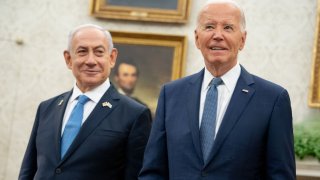One Year Into the Israel-Gaza War, Regional Integration Is Still The Way Forward
The past year has been a wake-up call for Israel, highlighting the limitations of the country’s traditional strategy. The collapse of the old foundations—internal unity, external disunity, and Western support—requires a new approach.
This dual reality—where the practical possibility of a two-state solution is fading even as the idea of Palestinian statehood gains international traction—underscores the complexity and contradictions of the current situation. It is a state that exists in theory, upheld by international declarations and diplomatic gestures, yet is nowhere close to materializing on the ground where conditions continue to deteriorate.
Regional Integration is the Only Viable Future
Israel faces a difficult dilemma. Attempting to end the Palestinian issue by force risks potentially fatal diplomatic consequences, and Israel’s political and economic future—and possibly its long-term survival—depends on achieving regional integration, which itself requires diplomatic normalization with neighboring states. Consider Saudi Arabia: the normalization of relations with the kingdom, the regional Sunni heavyweight, would be the clearest indicator of success for Israel’s integration strategy. Yet, as the Saudi foreign minister recently made clear in a recent article for the Financial Times, “Saudi Arabia will tirelessly work towards establishing an independent Palestinian state with East Jerusalem as its capital and will not establish diplomatic relations with Israel without this condition.” The statement is carefully worded: while normalization remains contingent on a two (or three) state solution, it acknowledges that despite Israel’s punitive and bloody campaign in Gaza—complete with reports of human rights abuses—the possibility of normalization has not been ruled out.
This, along with similar signals from regional governments and international actors, sends a clear message: if Israel wishes to achieve regional integration, it must find a way to address the Palestinian issue in a manner that allows for the emergence of a viable, peaceful neighbor.
As such, the events of the past year have underscored the urgent need for Israel to rethink its current strategy and prioritize regional integration over military dominance. Doing so offers Israel multiple benefits beyond economic growth. By embedding itself in the region’s economic and security framework, Israel can move from being a regionally isolated state to becoming an indispensable partner. This would involve trade agreements, infrastructure projects that connect Israel with its neighbors, and investment in regional stability. Initiatives such as the India-Middle East-Europe Economic Corridor (IMEC) could create new trade routes and solidify Israel’s role as a key player in regional commerce.
Deep down, Jerusalem knows this. Netanyahu himself is the one who kicked off the country’s economic transformation. It is telling that during his recent appearance at the UN General Assembly, Netanyahu held a map showing countries painted green, including Egypt, Sudan, Saudi Arabia, and even India, termed “The Blessing”—a map that just so happens to overlap perfectly with maps of IMEC countries, or what scholar Mohammed Soliman has dubbed as “Indo-Abrahamic West Asia.” In fact, Netanyahu has dubbed the initiative “a cooperation project that is the greatest in our history” and one that “takes us to a new era of regional and global integration and cooperation, unprecedented and unique in its scope.” Similarly, Israel Katz, the country’s foreign minister (and at one point minister of transport for a decade), has long advocated the construction of railways for “an Asian-European cargo link as an alternative to the Suez Canal.”
In a certain sense, it is fair to say that IMEC—along with Israel’s integration into the Middle East’s broader economy and transportation infrastructure—is the true, final purpose of the Abraham Accords. Yet, moving forward lies in addressing the root causes of remaining instability, particularly the Palestinian question.
To achieve its intended goal, the cold reality is that Israel must be willing to make difficult concessions. The settlements in the West Bank, the blockade of Gaza, and the treatment of Palestinians are all issues that must be addressed if Israel is to gain the trust of its neighbors. These concessions will be politically challenging, but they are necessary for building the kind of relationships that can lead to lasting peace.
Embracing a New Vision for Israel’s Future
The past year has been a wake-up call for Israel, highlighting the limitations of the country’s traditional strategy. The collapse of the old foundations—internal unity, external disunity, and Western support—requires a new approach.
Regional integration is not just a strategic necessity; it is an opportunity for Israel to redefine its role in the Middle East and build a future of peace and prosperity. By addressing the Palestinian issue, making necessary concessions, and investing in economic partnerships with its neighbors, Israel can transform itself from a nation constantly at war to a critical player in a more stable and prosperous region.
The alternative—a future of continued conflict, isolation, and diminishing support from allies—is untenable. For Israel, the time to act is now.
Carlos Roa is a Visiting Fellow at the Danube Institute and an Associate Washington Fellow at the Institute for Peace and Diplomacy. He is the former executive editor of The National Interest and remains a contributing editor of the publication.
Image: Prashantrajsingh / Shutterstock.com.

